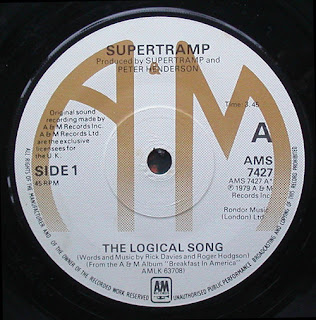SUPERTRAMP - THE LOGICAL SONG
Llançament: Març de 1979
Llistes d’èxits: EUA: #6 Regne Unit: #7
“The Logical Song” va ser publicada com el single principal de l’àlbum “Breakfast in America” i es va convertir en el major èxit de Supertramp, arribant al número 7 al Regne Unit i al número 6 al Billboard Hot 100 dels EUA. Va tenir un èxit especial al Canadà, on va liderar la llista RPM Singles Chart durant dues setmanes.
Escrita per Roger Hodgson, explora temes sobre l’educació i el seu impacte, en una línia similar a “School”, una peça anterior escrita per Rick Davies per a l’àlbum “Crime of the Century” de 1974. Tot i la seva col·laboració com a compositors, Hodgson i Davies solien escriure per separat. En una entrevista del 1979, Davies va reconèixer la semblança temàtica, però també va comentar que l’experiència personal de Hodgson era limitada, ja que va passar directament de l’escola pública al món de la música.
La cançó analitza la pèrdua de la innocència i la meravella de la infància a mesura que la societat imposa normes de lògica i responsabilitat. Hodgson la va escriure en un moment de confusió personal i d’un desig d’entendre el significat més profund de la vida, criticant el sistema educatiu per prioritzar la formació intel·lectual i descuidar el desenvolupament emocional i intuïtiu. En una entrevista del 2012, Hodgson va comentar que la cançó continua sent rellevant, sovint citada en escoles, on provoca reflexions en els estudiants sobre la seva identitat i propòsit.
“The Logical Song” era una peça profundament personal per a Roger Hodgson, desenvolupada inicialment durant proves de so i completada mesos abans de ser presentada a Supertramp. Al principi, Hodgson no estava segur que la resta del grup l’acceptés, però va acabar convertint-se en una de les seves cançons més rellevants. Igual que “Another Brick in the Wall (Part II)” de Pink Floyd, critica el sistema educatiu anglès per centrar-se en la funcionalitat externa i descuidar el desenvolupament intern i el veritable propòsit de la vida. Hodgson lamentava com la meravella i l’entusiasme naturals de la infància es perden sovint a través de l’escolarització i les expectatives socials.
Durant un concert, Roger Hodgson va explicar l’origen personal de “The Logical Song”, recordant els seus 10 anys en un internat, que el van deixar qüestionant la vida i els ensenyaments rebuts. La va descriure com una manera lleugera d’abordar qüestions profundes, destacant com se li havia ensenyat a conformar-se i ser sociable, però no an entendre la seva identitat o propòsit. Hodgson va assenyalar que aquest missatge profund va agradar a molts oients quan la cançó es va publicar.
SUPERTRAMP - THE LOGICAL SONG
Released: March 1979
Charts: US: #6 UK: #7
“The Logical Song” was released as the lead single from the album “Breakfast in America”. It became Supertramp’s biggest hit, peaking at No. 7 in the UK and No. 6 on the US Billboard Hot 100. The song was especially successful in Canada, where it topped the RPM Singles Chart for two weeks.
“The Logical Song,” written by Roger Hodgson, explores themes of education and its impact, similar to Rick Davies’ earlier song “School” from the band’s 1974 “Crime of the Century”album. Despite their songwriting partnership, Hodgson and Davies often wrote separately, and in 1979, Davies noted the thematic overlap but remarked on Hodgson’s limited personal experience, as he transitioned directly from public school to music.
This song examines the loss of childhood innocence and wonder as society imposes the constraints of logic and responsibility. Hodgson wrote the song out of personal confusion and a desire to understand life’s deeper meaning, criticizing the education system for prioritizing intellectual training while neglecting emotional and intuitive development. He noted in a 2012 interview that the song remains relevant, often quoted in schools, and sparks introspection among students about identity and purpose.
Roger Hodgson’s “The Logical Song” was a deeply personal piece, developed during soundchecks and completed months before being shared with Supertramp. Initially unsure if it would be accepted by the rest of the band, Hodgson found the song became one of the most quoted in schools. Like Pink Floyd’s “Another Brick in the Wall (Part II),” it critiques the English education system for focusing on outward functionality while neglecting inner development and life’s true purpose. Hodgson lamented how the natural wonder and enthusiasm of childhood are often lost through schooling and societal expectations.
At a concert, Roger Hodgson explained the personal origins of “The Logical Song,” recounting his 10 years at boarding school, which left him questioning life and the teachings he received. He described the song as a lighthearted way of addressing deep issues, highlighting how he was taught to conform and be acceptable but not to understand his identity or purpose. Hodgson noted that this profound message resonated with many listeners upon the song’s release.











Cap comentari:
Publica un comentari a l'entrada